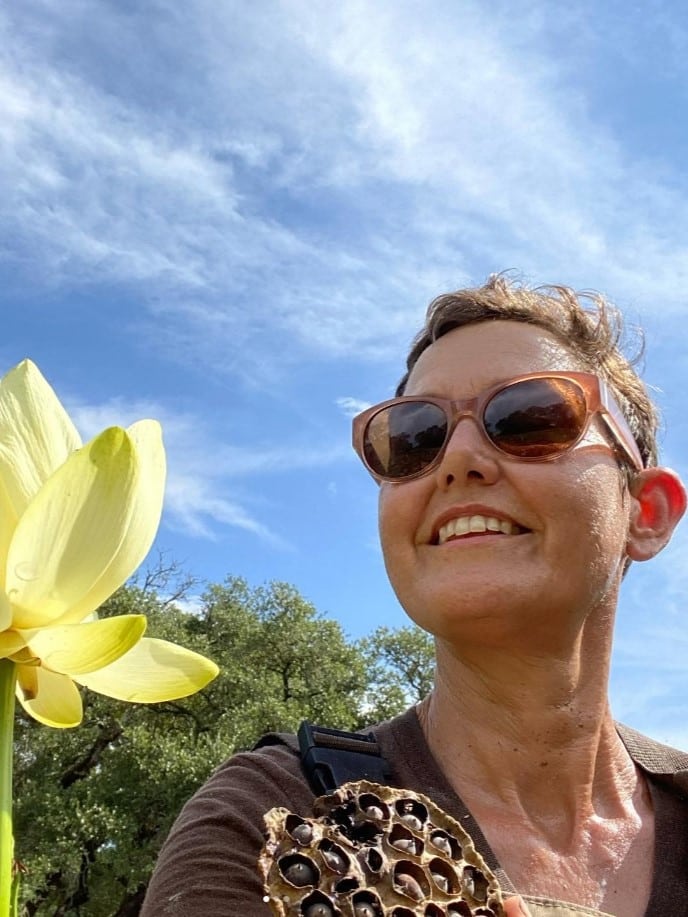Mary Carol Edwards
Owner of Green Star Wetland Plant Farm to Share Expertise as Land Care Institute Instructor
Beginning in 2024, the Houston Botanic Garden is proud to host a first-of-its-kind opportunity in the city: the Land Care Institute Certification Program. One of the course instructors is Mary Carol Edwards, the owner of Green Star Wetland Plant Farm and an advocate and expert in sustainable landscapes. She recently spoke with the Garden about the program, and about fostering environmentally minded land stewardship. In the discussion below, she sheds light on the reasons this course is needed, and the significant positive impact this collective work can achieve.
The Land Care Institute approach to landscape management supports and sustains the immediate and surrounding environment and embraces landscaping as a functional and holistic benefit to people and the planet, rather than a purely aesthetic endeavor.
In bringing a land care program like this to Houston, the Garden hopes to educate, empower, and guide landscapers and homeowners toward a different way of interacting with their land—a way that values plant, animal, and insect life and better connects us to the natural environment.
The Power of Stewardship
The Land Care Institute certification offers more than just practical education. It’s also a way to reinforce the importance of intentional land stewardship. “Choosing to be a steward of the land is very powerful because every schoolyard, front yard, church, temple, or parking lot matters when it comes to creating a landscape that supports an ecosystem,” Mary Carol says.

Being a steward challenges the notion of property boundaries, highlighting the interconnectedness of life beyond human-made delineations. “Property lines don’t exist for a bird that flies through them. A firefly or oak tree doesn’t care who owns the deed on the land. What matters to them is whether their lives are benefitted, or not benefitted, by a place. When you think of it this way, there are really no boundaries to a landscape, only beneficial or non-beneficial practices. Learning how to create healthy landscapes from a community of practitioners is a great opportunity,” she says.
Re-evaluating Current Trends
Prevailing landscape trends may be aesthetically pleasing or low-maintenance to some, but these kinds of decisions have long-lasting ecological consequences that could be avoided. As Mary Carol notes, “‘Low maintenance’ has long been a buzz in landscaping and for about 10 years, that’s been showing up as layers of gravel or plastic grass. Besides being energy-intensive to produce plastic or haul rocks to Houston, the soil underneath a treatment like that is not going to be alive.”
The good news is that experts with the right training can offer substitutes. “There are better ways to go low maintenance,” Mary Carol says.
Missteps in Sustainability
Reflecting on common pitfalls in the landscaping industry, Edwards underscores the importance of authentic ecological practices. She observes that the convenience of opting for easily accessible cultivars often overshadows the ecological significance of native plants.
“It takes a little more effort to locate truly native plants, so we have to do some research and plan ahead. Cultivars may be easier to source but might not give full ecological benefits because they have been bred to appeal to humans, not pollinators,” she says.
Edwards warns against hasty decisions that undermine the intended ecological balance of landscapes, illustrating with a cautionary tale: “For example, landscapers bought European fan palms instead of dwarf palmettos for a Texas native plant demonstration garden. Besides a superficial similarity, nothing about those two species is interchangeable!”
The Human Connection
Edwards emphasizes the profound impact of daily landscapes on human well-being. Drawing parallels between the needs of birds and humans, she asserts, “If a landscape benefits a bird, it benefits a human. If we zoom out from the planting beds we tend to focus on as ‘landscape’ to include parking lots, streetscapes, and fields of St. Augustine grass, we will see quite a lot of landscape that is not conducive to the well-being of a bird. Why should anyone think that’s okay for us humans?”
Edwards challenges us to evaluate our surroundings critically, saying, “Sometimes I play a game where I look at a landscape and see if there is anything at all that would sustain a bee. If a landscape can’t feed a bee or me, I don’t think it’s a very good landscape.”
Envisioning a Vibrant Future
As for the aspirations tied to the Land Care Institute Certification Program, Edwards harbors a vision of transformation for Houston. She believes in the power of collective learning and inspiration, saying, “People learn from each other and pick up practices that they admire and understand.”
Edwards sees a future where sustainable landscapes proliferate, fostering a ripple effect of positive change. “I like to envision what Houston would be like if we reached a tipping point in creative, sustainable landscapes vibrating with life. It would be amazing!”
The Garden’s Land Care Institute is a hybrid certification program encompassing more than 40 hours of detailed instruction and expert advice offering an in-depth look at what it means to landscape sustainably, presented as biannual training courses delivered primarily online, supplemented with round-table gatherings in-between.
The four-week course begins January 23 and covers soil ecology; site analysis and design; organic pest, weed, and disease control; rainwater management; invasive plants; and more. A limited number of spots are still available; find more information and sign up here.